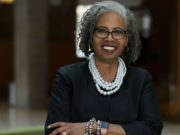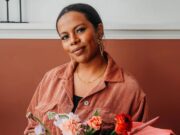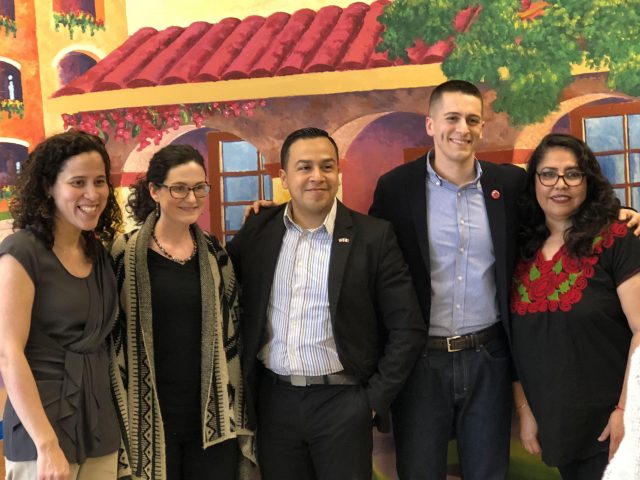The smell of wet dirt filled Cesar’s nostrils. He was trying to lay as still as possible amidst the rocks and stones. Silence filled the air. And fear. And excitement. And confusion. Out in the distance were bright lights, the lights of a new country. A new life. A new opportunity. But for Cesar, none of that registered. He was just trying to stay as close to his mother as possible so he would not lose her in the chaos about to unfold.
VAMANOS! A voice cried out suddenly, shattering the silence.
Suddenly Cesar and everyone he was with were off running. Running towards the border to America and a new world and a new life. He was filled with fear as his mother fell down while they ran. But she stood back up and ran again.
“We were just running, just running, just running,” Cesar told an audience at Centro Hispano. “I remember my mother falling down flat on her face. She got up and she just kept running. She could have been killed, she could have been raped, but the love of her children propelled her.”
It was a jarring, emphatic ending to a day that had been unlike any other in Cesar’s young life. His last day in Mexico and his first day in the United States.
Early in the day his mom had picked him up from school. He can still remember the clanking noise of the chalk and the smell of the glue. He was excited to go home, as all kids are as the school day comes to a close. But instead of going home his mother took him to pick up his little brother, who was about 3 years old, and his two older sisters.
She took them to a cathedral where she knelt down and asked God to watch over them.
“She was a tower of courage at that moment,” Vargas said. “It was surreal. She had a plastic bag. She had our birth certificates, medical records, some cash. Just a plastic bag to start a new life. A plastic bag is all she was going to take to start a new American life.”
Cesar Vargas capped a weekend in Madison by delivering a heartfelt, emotional talk at Centro Hispana late on Sunday afternoon to a roomful of people. Every detail: From his mother’s flowing blue dress, to the dangerous run across the border, to the tense moments he faced pursuing his law degree, were brought into focus.
Cesar didn’t leave anything to the imagination. Because this was his story. The story he needed to tell. And all the details mattered. Not just for himself. But for the other 7 year old boy laying on the stoney ground with his mother waiting for the border guide to say RUN!
Cesar Vargas is an attorney and holds the distinction as the first and possibly only openly undocumented attorney in the State of New York. He has been in nearly every state in the country lately, giving talks and telling his story.
For Cesar, it wasn’t enough to just make it on his own. He needs to help others make it too.
On Saturday, he was at the University of Wisconsin Law School addressing the students there. Sunday saw his speech at Centro along with UW historian Sergio Gonzalez, who also spoke about his book “Mexicans in Wisconsin,” detailing the long and unwritten history of Mexicans in dairy communities, urban areas and white spaces of Wisconsin.
February 3, 2016. Cesar Vargas remembers that day. It was the day he was sworn in as an attorney in downtown Brooklyn. Like with all of his other stories he remembers every detail: His mother’s towering presence again, the marble steps, the pomp and circumstance.
It took years for him achieve his dream of being sworn in that day. When he first went to college he got an email one day from the school asking him to show his social security number and, basically, prove he was a citizen. He wasn’t. So he deleted the email. Another one came and he deleted that one too. Eventually, he was called up to see the Dean. The Dean told him they may have to end his education there or even report him to immigration. But Cesar’s school advisor, who was aware of his status, intervened with the Dean and the matter closed.
Yet the impact on Cesar remained.
“I decided then that I couldn’t just get by anymore,” he said. “I needed to do more. I needed to tell my story. Telling my story enabled me to get a full ride scholarship to law school. People need to know. Your story is very powerful, our story is very powerful. For me being able to graduate was an incredible experience. As I walked to the podium for my diploma I realized I might not get my law degree because of my immigration status.”
When it was time to receive that law degree, Cesar saw a box at the bottom of a form asking his immigration status and social security number.
“I couldn’t go back to the shadows. So I wrote in big bold letters NO PAPERS, I AM UNDOCUMENTED. New York state would have to confront it,” he said. “Days turned into weeks into months into four years. And still they didn’t give me my license. I watched all the people who went to law school after me and all my classmates getting their licenses and getting jobs. But I realized I had a different path. That I could help organize. That I could meet President Obama and help create DACA. I was able to get people to come together and really fight this case and say your immigration status should have no bearing on your ability to be an attorney.”
In the end, he won, being admitted to the bar in 2016. He’s gone on to open the doors for others, across many professions, to be able to be licensed in various fields in spite of their immigration status. And today he inspires thousands of people to take pride in pursuing their dreams and show courage.
“The American dream is not about a fancy car or big house,” he said. “It’s about opening the doors to other people just as people opened the doors of opportunity for you. You do it for other people. And that’s what the American dream is about. There’s a problem in this nation. But I know we can come together. We have overcome this problem before. We can overcome this problem again. It doesn’t matter where you come from. Your birth doesn’t dictate your future. We all have a voice, citizenship or not.”




























